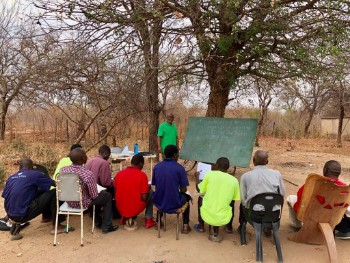
Kentucky Baptists partnered with IMB missionary Nick Moore and national pastors to take theological training to Zimbabwe.
ZIMBABWE—On Oct. 6-15, 13 Kentucky Baptists embarked on a mission trip to Zimbabwe, partnering with IMB missionary Nick Moore. Unlike a typical mission trip, their purpose was twofold: “to train pastors and lay leaders” and to “explore and model racial reconciliation,” according to Doug Williams, missions strategist with the Kentucky Baptist Convention.
Before the trip, each participant read “Removing the Stain of Racism from the Southern Baptist Convention” edited by Jarvis Williams and Kevin Jones. Practical racial reconciliation was a key focus of their time spent together as a team. Getting to know each other, learning about each other’s ministries and lives was a large part of travel time and nightly discussions.
In addition, openness about how to further improve race relations in the Southern Baptist Convention dominated group discussions. Williams said that during the trip, he saw “the overall experience of talking through issues related to race, how the gospel breaks down all dividing walls,” and believers modeling how to live in community begin taking shape. The team consisted of five Anglo-Americans and eight African-Americans.
Even Zimbabwe nationals appeared to notice the uniqueness of this trip. For Joel Bowman, pastor of Temple of Faith Baptist Church in Louisville, it was his second mission trip to Zimbabwe. He noted, “A powerful moment in our mission trip to Zimbabwe was when a continental African said I was the first African-American missionary he had ever seen.”
Once on the ground, the team collaborated with national pastors and took theological training to areas from where it is impossible for leaders to travel to the national seminary.
Justin Compton, lead pastor of Redemption Hill Baptist Church in Fisherville, described the scene as “a land of theological famine.” Some who received training had never received any before. “I was humbled and overwhelmed to see God open eyes and shape lives through the clear teaching of his Word,” he said.
Some of the sites had received training last year by a five-member KBC team. Overall, the teams taught six courses (three at each location) including New Testament, Systematic Theology 1, Ecclesiology, Expository Preaching, Soteriology, and Hermeneutics.
“They were very eager to get the word of God right,” Williams said of the national students. “That was very encouraging to our team members.”
The team spent the last day in a remote village, going door to door—hut to hut—sharing the gospel with whoever would listen. Many made professions of faith.
Bowman’s desire is for this trip to provide “a model that could be replicated across the country.”
“When people see black, brown, and white believers serving as equals, there is a powerful Christian witness. There is a tangible example of the transformative and uniting power of the gospel of Jesus Christ,” he said.
Bowman continued, “Racial reconciliation only truly takes place within the context of relationships,” and as Williams stressed, that was the entire idea behind the trip.
“The trip was an amazing opportunity for healing and hope for several pastors who felt that many within evangelicalism in general and the SBC in particular had given up on confronting the sin—racism—that so easily besets us,” Curtis Woods, associate executive director of the Kentucky Baptist Convention, added.
“The experience was one of the most amazing conversations I have had on race, racism, and friendship. God’s grace was all over our team,” he said. “We can only pray that God would increase our numbers next year for the sake of the gospel and racial unity.”
The KBC hopes to replicate the trip twice in 2018. (WR)
Myriah Snyder